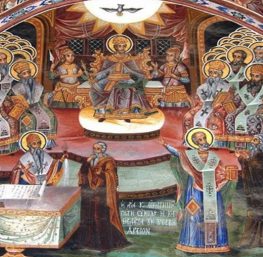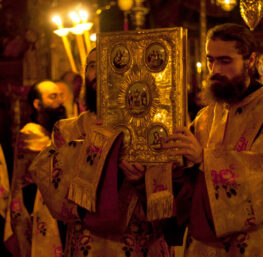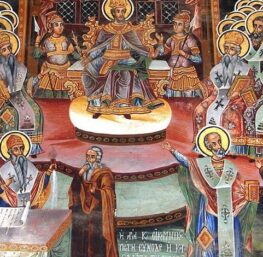Rev. Dr. George C. Papademetriou
http://www.goarch.org/print/en/ourfaith/article8075.asp
Orthodox Christianity is committed to the truth claim of the Christian Faith. This claim includes the Biblical truth that all human beings are created by God in His image and that Christ is the only Savior of the world.
Consequently, Orthodoxy is strongly committed to Christ as the Messiah and to the tolerance of other religious expressions. In this double commitment lies the source of a creative tension for Orthodox Christians involved in the interfaith dialogue and attitudes of the non-Christian religions.
Orthodoxy affirms continually the centrality of Christ in the Church and world. He is “the same yesterday and today and forever” (Hebrews 13:8). Orthodox Christians are committed to the truth claim of the Christian Faith not as ideology but as an expression of holiness. At the same time Orthodoxy is committed to the tolerance of other religious expressions.
Orthodox Christian people most often live in societies of cultural, linguistic and religious pluralism. For that reason, the Orthodox have developed an attitude of respect for others, and a tolerance and understanding for people of other faiths. The Orthodox Church does not have an “official” pronouncement expressing the attitude toward other religions. However, Orthodoxy has a long-standing tradition showing respect and tolerance for people of other faiths. It is well-stated by an Orthodox Christian theologian and Archbishop, Anastasios Yannoulatos, of Albania, that, “being created in the image of God, every human being is our brother and sister.”
It is a strong Orthodox view that our commitment to the Christian truth claim must affirm a pluralistic democratic setting for all people to live in peace and harmony. Orthodoxy holds fast to the truth of Christianity and defends the right of other religious expressions to co-exist in harmony in a democratic system where the law equally protects all.
The question of truth is of highest importance to Orthodoxy. “What is Truth?” Pontius Pilate asked (John 18:38). Christ kept silent. Christians interpret this silence a His reply that the “Truth” was standing before him-Christ is the “Truth.” “Truth” makes reference to the knowledge of being. Tolerance “implies a certain relationship of religious faith with truth in every concrete manifestation in the world, whether national political or sociological” (Damaskinos Papandreou, “Truth and Tolerance in Orthodoxy”). The source of all truth is God the Creator, who gives existence to all beings. God is the originator and the human being is the receiver.
For Orthodoxy there is a fusion between the truth claim of Christianity and a mandate for tolerance. We may say that one cannot be a Christian if he/ she does not embrace the doctrine of tolerance as a mandate of Christian love.
This most significant teaching of tolerance in Orthodoxy is contained in an encyclical letter of Ecumenical Patriarch Metrophanes III (1520-1580). This document was written to the Greek Orthodox in Crete (1568) upon hearing of the mistreatment of the Jews. In it he states, “Injustice, therefore, is and stands, regardless to whomever acted upon or performed against, as still injustice.
The unjust person is never relieved of the responsibility of these unjust acts under the pretext that the injustice done is done against a heterodox and not to a believer. As our Lord Jesus Christ in the Gospels said, “Do not oppress or accuse anyone falsely; do not make any distinction or give room to the believers to injure those of another belief.”
I close with the thought that all human beings are the children of God created in His image, and tolerance of other people having different faith is an imperative commend given by Christ himself. I am also committed to the words of our Lord, “I am the Way, the Truth, and the Life” (John 14:6).
Source: Boston Theological Institute, BTI Newsletter, Newton Centre, MA
© 2003 Greek Orthodox Archdiocese of America




While I suppose I generally agree with Fr. George’s thesis here, there are a number of statements in this article that rub me the wrong way, either because of what they fail to say or because they are just flat wrong (or so it seems to me). For instance:
— With an annoying bit of redundancy, Fr. George affirms this “fusion” between Orthodox Christian truth claims and Orthodoxy’s support of the principle of religious tolerance. Has Orthodoxy always supported the latter principle, however, and is this democratic principle really in its blood? I would argue that historical considerations demand a negative answer to the first question and that both historical and philosophical considerations should give us pause about a positive answer to the second question. Respectively, Orthodox cultures have not practiced the form of religious toleration that is practiced under the American Experiment, and it may be argued that such political experiments, having no common spiritual vision is doomed to be just that, an experiment. It remains to be seen how well pluralism will serve us, as it is arguably the case that it is pluralism in all of its forms (relativism, multiculturalism, etc.) that is causing the West to come apart at the seams.
— Except for modern times, when has Orthodoxy ever been interested in “interfaith dialogue?”
— Where in the Gospels did Christ ever say, “Do not oppress or accuse anyone falsely; do not make any distinction or give room to the believers to injure those of another belief”? Perhaps Fr. George is working with an obscure English translation here, but I searched in vain for such a statement in the standard English translations with which I’m familiar.
A rather weakly argued case, if you ask me.
As I have a wide and sensitive reactionary streak, I apologize up front for any offense.
Dr Peter Toon taught our seminary class that the word “tolerance” is not mentioned in the Scriptures, cover to cover. This is not to say, of course, that it is equal to vice. I believe Dr Toon’s point was that it seemed to be the ONLY virtue in secularized Christianity [aka modernity].
The article’s repetition of the word “democracy” would, no doubt, have seemed strange to our forebears in the Faith, under monarchs.
If you want to discover just how democratic and tolerant the Orthodox can be, tongue firmly in cheek here, read “The Orthodox Church in the Byzantine Empire” by J.M. Hussey.
Mostly I take issue with the above article’s final claim that “all human beings are the children of God.” It is my belief, taught by the Church, that we become sons [children] of God by adoption — through Christ.
Correction invited.
The leaps of logic in the article are utterly amazing. The Rev. Dr. George C. Papademetriou makes a statement about the Orthodox Christian faith that is obviously true and then links it with a separate, logically and dogmatically unsupported claim of tolerance. Had I written like this when I was in college, my professors would have given me a failing grade.
The biggest logical error the Rev. Dr. George makes is confusing the reality that all men are created in the image of God with the assumption that we must therefore tolerate every religious expression they may have as somehow connected to that image. That is just wrong. In fact, the opposite is more often true—most people’s idea of God and religion is drastically distorted by our falleness and our individual sin.
The main job of the Church is to unwaveringly hold, teach, and practice the revealed truth of God. Such a mission often means the Church has to tell folks they are wrong in their belief, in the conduct or the lives and they need to come to repentance. The type of government under which the Church finds herself is immaterial. If the teachings of the Church support any form of government, Christian monarchy would be the choice, not pluralistic democracy.
Our witness to the truth must be done with love, realizing the fate of souls is in the outcome. How can we be faithful to our crucified Lord, if out of cowardice, we allow people to continue in beliefs and practices that do not lead to salvation?
Jesus Christ offended nearly everyone, not from arrogance, but because He loved us so much. He was not tolerant of diverse forms of religious expression, he was tolerant of individual sin as long as the person was on a path of repentance.
The temptation to universalism (the belief that everyone will be saved perhaps even Satan) is profound. Even St. Gregory of Nyssa struggled with it. However, judgement and damnation is a reality. A reality which the Rev. Dr. seems to miss. His attitudes seemed shaped by the experience of oppression which the Church has had to endure for so long. Although in some ways our oppression has strengthened us, in others it has made us timid. We must shake off that timidity and return to the Truth.
What Michael said is so true: “most people’s idea of God and religion is drastically distorted by our falleness and our individual sin.”
How much of our view of God is no more than a projection of what we wish for Him to be or what we ourselves are? The bloodthirsty see an Avenger and Wrathful Punisher. The cowardly see an eternal Pacifist. Thomas Jefferson remarked “In our Richmond there is much fanaticism, but chiefly among the women. They have their night meetings and praying parties, where, attended by their priests, and sometimes by a hen-pecked husband, they pour forth the effusions of their love to Jesus, in terms as amatory and carnal, as their modesty will permit to a merely earthly lover.” So here Christ becomes the earthly Lover.
Perhaps we must completely empty ourselves of ALL images first before we can even approach it.
Open letter to Orthodox Christian clergy:
I am a convert to the Orthodox Church being Baptized and Christmated in May, 1987. Prior to that, I was not really a Christian. Although I belonged to a group that professed faith in Jesus Christ, it actually taught practically every one of the major heresies at one time or another. I know what being received into the Church has accomplished in my soul, that knowledge comes from the ontological experience I had during and after my Baptism plus the ongoing experience of the sacraments along with the love and support of by brothers and sisters in Christ. One of the reasons I accepted the leading of the Holy Spirit to come into the Church was her uncompromising teaching on the nature of God and His inter-communion with us. My experience confirms the teaching. When people like myself are dying out there, spiritually and physically, because of the false and heretical teachings of those calling themselves Christians especially in the World Council of Churches and the National Council of Churches, why do we continue playing the game of ecumenical dialog. Do you really believe we are the One, Holy, Catholic and Apostolic Church or not. If you do, stop compromising for the sake of political expediency – if you don’t believe from the bottom of your soul, should you be acting as a leader or administering the sacraments?
Our participation in such organizations only gives them cover and damages our own witness. We should lovingly proclaim where the other Christian traditions are in error and lovingly invite their repentance and return to the fullness of the truth. We should cooperate with others in humanitarian projects where we can and join our voice to theirs where their stance is authentically Christian. Aside from that, we should be firm in proclaiming the fullness of the Gospel.
In the United States, all of our jurisdictions must extricate themselves from the politics of the countries in which our mother Churches reside and move as quickly as possible to true unity here. We must also extricate ourselves from the timidity brought on by centuries of Dhminutude. Too many of our hierarchs are more concerned with the politics of the old country than with the cultural and spiritual war going on here. Full attention is needed here.
Such actions as I outline will offend many people. That, frankly, should not be a concern as long as we are acting from the trust we have been given to proclaim and practice the truth, bringing the saving grace of our Lord, God, and Savior, Jesus Christ to the suffering world. In fact, we should expect to be hated as our Lord is hated.
I have met many wonderful and dedicated priests and bishops who carry both the Joy of the Lord and a sense of Holiness. Speak to the world and not just to the Orthodox faithful. When I see so many of the heterodox purporting to represent the Christian faith on TV, I am angry. When I see Bishops who curry favor with politicians who deny basic tenants of the faith, I am angry. So many of our public statements are so weak, so vacillating, and so timid as to be worse than meaningless. The teaching, practice, and faith of the Orthodox Christian Church is the antidote for what ails the world because she provides for the Communion with our Lord Jesus Christ in a way that transforms
I am discouraged when I see statements by Orthodox clergy such as the one here and professors such as elsewhere on this blog that seem to be founded on politically correct sentiment rather than the revealed truth and experience of the Church. We converts out here know the poison of false and heretical teachings. We have experienced them first hand. Often many years of healing must take place after we have found the refuge of the Church. I implore you, don’t throw away your birthright and our re-birthright for a pottage.